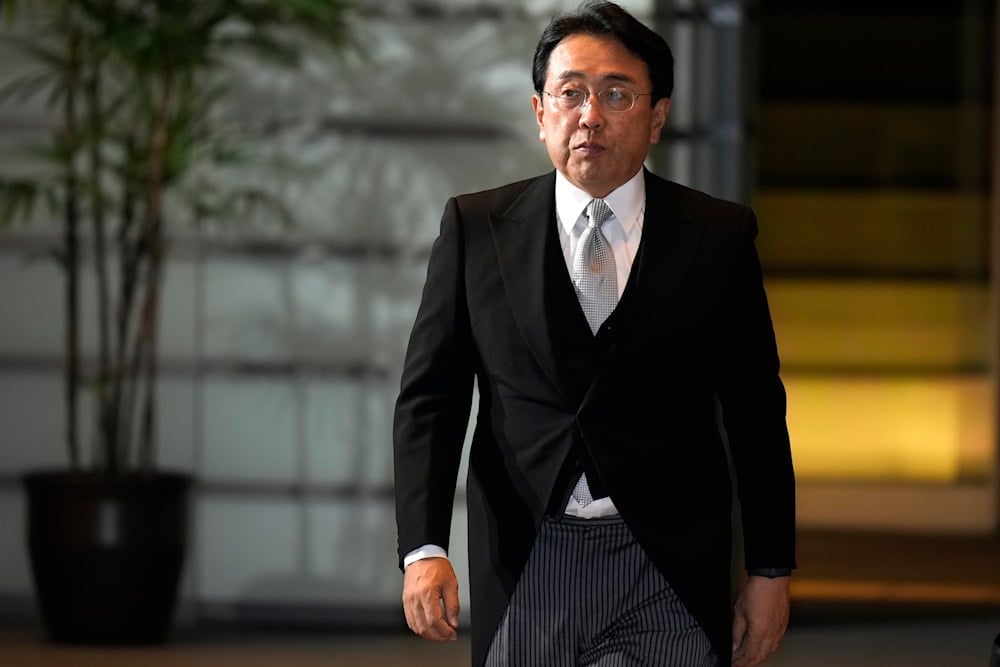Japan top trade envoy says US tariffs cut company profits 'day by day'
Japan’s top trade envoy Ryosei Akazawa warns that tariffs are slashing corporate profits, as he heads to Washington to urge a swift resolution and address broader economic and energy issues with US officials.
-

Ryosei Akazawa, Japanese minister in charge of Economic Revitalization, arrives at the Prime Minister's office on October 1, 2024, in Tokyo. (AP)
Japan’s lead negotiator for the upcoming tariff talks with the US warned Monday that domestic companies are seeing their profits decline “day by day,” urging a quick resolution to the dispute.
Prime Minister Shigeru Ishiba informed lawmakers that Economic Revitalization Minister Ryosei Akazawa will travel to Washington this week for the discussions.
Tokyo has so far been unsuccessful in its efforts to obtain exemptions from the US tariffs, including the 25% levy on the global auto industry implemented in early April.
Speaking in parliament, Akazawa said that US President Donald Trump is also considering a separate 24% tariff on Japanese goods, which is currently on hold.
“As some tariffs have already taken effect, Japanese companies’ profits are being cut day by day,” he warned, adding, "the sooner [the issue is addressed], the better."
In Washington, Akazawa will reportedly issue a strong call for a review of Trump's tariffs, adding, "I will do my best, bearing in mind what's best for our national interests and what is most effective."
Japanese media, citing government officials, reported that Akazawa is scheduled to meet with Treasury Secretary Scott Bessent and US Trade Representative Jamieson Greer on Wednesday.
Japanese companies are the largest foreign investors in the US, with vehicles making up roughly 28% of Japan’s 21.3 trillion yen ($142 billion) in exports to the US last year.
Japan flags tariff concerns
On Monday afternoon, Japanese Prime Minister Ishiba spoke by phone with Singaporean Prime Minister Lawrence Wong to discuss the consequences of US tariffs and China’s countermeasures.
According to Japan’s Foreign Ministry, Ishiba told Wong that “the current situation is serious for Japanese companies operating in Southeast Asian countries including Singapore.”
In an interview with the Yomiuri Shimbun published Monday, Akazawa emphasized the need to understand US intentions before entering negotiations.
Echoing remarks previously made by Japan's trade minister, he said, "We have to convey our message that we have serious concerns as to consistency with the World Trade Organization agreement and Japan-US trade agreement."
Akazawa also indicated he would be open to discussing liquefied natural gas (LNG) development in Alaska if the topic is brought up by the US side, according to the Yomiuri.
Japan and South Korea were among the nations that showed interest in partnering with the US on an LNG pipeline project in Alaska.
Trump pauses tariffs for most nations, not China
Trump abruptly paused planned tariff hikes on most countries on April 11, igniting a wave of optimism in global markets. However, the move came with a sharp escalation in tensions with China, as Trump increased tariffs on Chinese imports to 125%, citing a "lack of respect" from Beijing.
The move followed Beijing’s decision to retaliate against previous US tariffs by imposing an additional 50% duty on American goods.
Markets across the globe surged following Trump's announcement, with Wall Street rebounding sharply after days of volatility and Asian markets following suit, uplifted by the news that nearly all countries would be spared additional tariffs for 90 days.
However, the relief was short-lived in some quarters, as China swiftly retaliated with 84% tariffs on US goods, effective 12:01 pm Thursday. The tit-for-tat measures marked the latest flashpoint in the deepening standoff between the world's two largest economies.

 4 Min Read
4 Min Read










